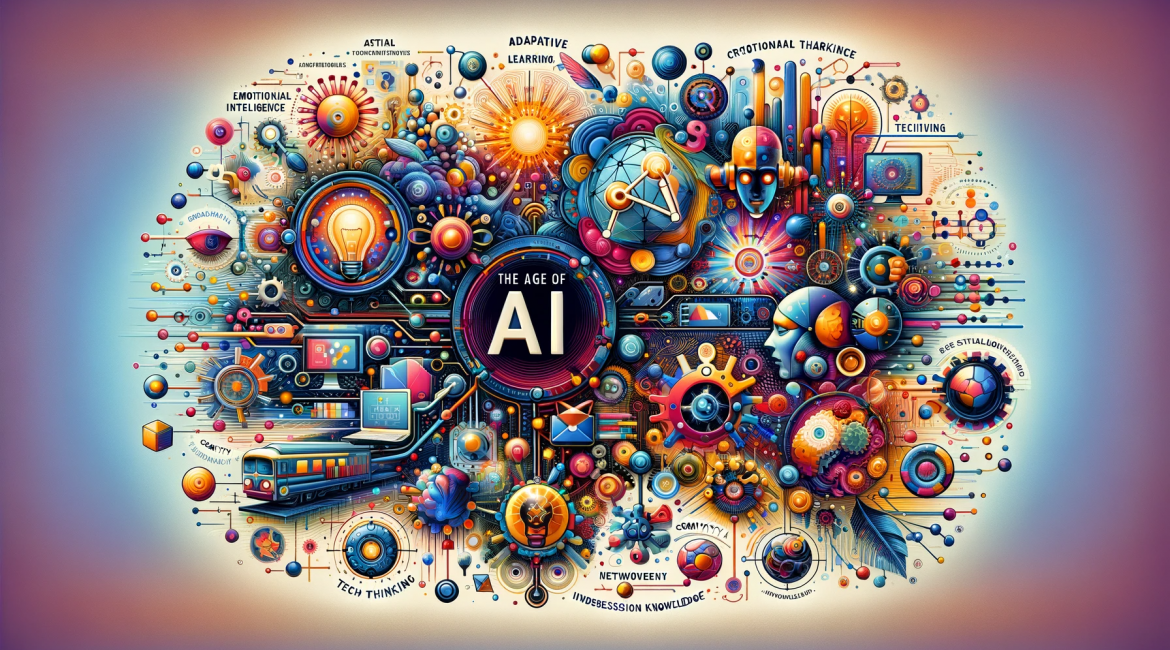In an era dominated by rapid technological advancements, particularly in the realm of Artificial Intelligence (AI), the demand for new skill sets is more critical than ever. These skills extend beyond mere technical know-how, encompassing a wide range of competencies crucial for success in the age of AI. Let’s explore these essential skills in detail, shedding light on their importance and how they can be developed and harnessed for thriving in the digital era.
Adaptive Learning: Embracing Continuous Evolution
In the dynamic landscape of AI, where new technologies and methodologies emerge constantly, the ability to adapt and learn is paramount. Adaptive learning isn’t just about acquiring new information; it’s about being open to change, willing to unlearn outdated practices, and eager to embrace new approaches. This skill is crucial in an environment where AI algorithms and applications evolve at breakneck speed.
To cultivate adaptive learning, immerse yourself in ongoing education, be it through formal courses, online tutorials, or workshops. Engage in diverse learning experiences that challenge your current understanding and open doors to new perspectives. This continuous learning journey ensures that you remain at the forefront of AI advancements, equipped with the latest knowledge and insights.
Emotional Intelligence: Navigating the Human-AI Interface
Emotional intelligence (EI) becomes increasingly important as AI systems take over more logical and data-driven tasks. EI involves understanding and managing one’s own emotions, as well as empathizing with others. In an AI-driven world, this human-centric skill facilitates better teamwork, leadership, and client relations.
Develop EI by practicing mindfulness, engaging in active listening, and participating in social activities that require empathy and understanding. Work on your communication skills, focusing on clarity and sensitivity to the emotional context of interactions. Emotional intelligence workshops and seminars can also provide valuable insights and practical techniques.
Tech-Savviness: Understanding the Language of AI
As AI becomes more integrated into various sectors, having a foundational understanding of AI technologies is essential. This doesn’t mean you need to be an expert, but understanding the basics of how AI works, its capabilities, and its limitations is crucial. This knowledge allows you to effectively collaborate with tech teams, make informed decisions, and stay aware of how AI impacts your industry.
Begin by exploring resources through finding communities and thought leaders. Attending AI-focused webinars, seminars, and industry conferences can also provide valuable insights.
Critical Thinking: Beyond AI’s Calculations
In a world where AI can process vast amounts of data and provide logical solutions, the human capacity for critical thinking remains a unique asset. Critical thinking involves analyzing information objectively, identifying biases in AI outputs, and making judgements based on a combination of data and human insights.
Enhance your critical thinking by engaging in activities that challenge your reasoning and analytical skills. Participate in debates, join problem-solving groups, or take on projects that require you to evaluate complex information from various angles.
Creativity: AI’s Unattainable Frontier
Creativity remains one of the most distinctly human traits, one that AI has yet to replicate successfully. In an AI-dominated era, being able to think creatively – to innovate, ideate, and imagine – is invaluable. Creative thinking drives progress in arts, science, business, and technology.
Foster creativity by stepping outside your comfort zone. Explore new hobbies, collaborate with people from different backgrounds, and engage in brainstorming sessions. Allowing yourself time for free thinking and daydreaming can also spark creative ideas.
Interdisciplinary Knowledge: The Convergence of AI with Other Fields
The future belongs to those who can bridge AI with other disciplines, be it ethics, law, healthcare, or environmental science. Understanding how AI intersects with these fields can position you as a leader in a rapidly evolving landscape.
Pursue knowledge in areas outside your primary field of expertise. Attend interdisciplinary seminars, take online courses that blend AI with other subjects, and engage with professionals from different sectors. This broadened perspective will enable you to apply AI in innovative and impactful ways.
Networking and Collaboration: Building Bridges in a Digital World
In the digital age, networking isn’t just about building professional relationships; it’s about creating a web of collaboration that extends across industries and borders. Effective networking can lead to new opportunities, insights, and partnerships in the AI space.
Actively participate in industry events, online forums, and social media groups focused on AI and technology. Seek mentorship and offer your expertise to others. Collaborating on projects and participating in think tanks can also expand your professional network.
In conclusion, as we navigate the uncharted waters of the AI era, these skills become the compass guiding us towards success. By fostering adaptive learning, emotional intelligence, tech-savviness, critical thinking, creativity, interdisciplinary knowledge, and effective networking, we cannot only keep pace with AI’s advancements but also shape its trajectory. These skills ensure that we remain indispensable in a future where AI reshapes the very fabric of our professional and personal lives.




